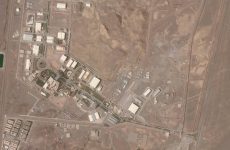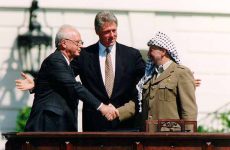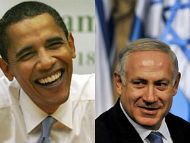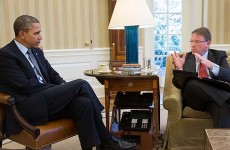
The Israeli newspaper Haaretz quotes intelligence sources both in Israel and the US as saying that the mysterious explosion at the Natanz facility may have incapacitated it for as many as nine months. A large explosion completely destroyed the facility’s internal electrical system that supplies power to the underground centrifuges enriching uranium. And the report adds, “Israel has a hand in the incident.”
Meanwhile, the senior Iranian atomic energy official continued to play down the incident describing it as a “small blast,” adding that “the damage could be repaired in a short time.” Other Iranian officials were vowing to retaliate, charging that it was designed to interfere with the new round of nuclear negotiations between Tehran and Washington now underway in Vienna.

In Jerusalem, PM Bibi Netanyahu declared, “I will never allow Iran to acquire nuclear weapons!” Netanyahu was speaking after a meeting with visiting US Defense Secretary Lloyd Austin. Speaking with Austin at his side, Netanyahu went on to say, “You have just come from the Yad Vashem Holocaust Memorial where last week we marked the Shoah. I think there is an understanding between us that we will never allow it to happen again. I think President Biden and you will fulfill this. The US has no greater ally than Israel.” Secretary Austin replied, “I wish to clarify my personal commitment to Israel’s security and qualitative edge and preserve ties with the US. I am certain we can advance peace in the region with stability and security.” Not a word about Biden’s attempt to revive the nuclear deal with Iran that was abrogated by former President Donald Trump.
The new US President is bent on restoring the accord that, at best, delays but does not bar the Ayatollahs from secretly developing nuclear weapons. The odds are that if both Washington and Tehran want it, it will be resuscitated. There is no mistaking President Biden’s determination to focus on rebuilding America’s economy and infrastructure. The Middle East and other foreign policy issues, aside from China, are definitely on the backburner. It will not be a surprise if the Biden administration reduces its foreign aid package of some 85 billion dollars a year, of which 4 billion goes to the IDF.
As for the Iranians, they will try hard to persuade Washington to ease the sanctions but are unlikely to give in on halting their nuclear weapons program. Although Washington and Jerusalem will again disagree, there is little Israel can do about it in the diplomatic arena. From the regional perspective, the Arab Gulf states are also in Iran’s nuclear sights, and they know it. This could induce them, and eventually Saudi Arabia, to strengthen their new alliance with Israel. They are no less threatened by a nuclear Iran.
Political turmoil with no end in sight…
There is still no sign of a breakthrough in forming a new government following the latest election on March 23, which ended in a deadlock. At present, neither incumbent PM Netanyahu nor his rivals, Naftali Bennett or Gideon Saar, can form the necessary 61-seat majority in the 120-member Knesset. But the preponderance of Israeli voters has swung to the Right, leaving Yair Lapid, who has the second-biggest party, with no real chance of forming a majority coalition. Meanwhile, Gideon Saar (a former Likudnik who split with Netanyahu in anger) is considered a potential PM. Behind the scenes, Netanyahu and all the political leaders are trying to beg, borrow, or steal elected candidates from other parties to get them over the required 61-seat majority. So far, to no avail.
And where you might ask, is Labor-Mapai that was once led by the likes of David Ben Gurion, Golda Meir, and Yitzhak Rabin? The fact is that the party has nearly been wiped off the political map. And why is that, you may ponder; simply because Labor’s attempt at peaceful coexistence with the Palestinians was never reciprocated by the other side, whose leaders contend to this very day that the Jewish people have no right to their own state in their historic homeland.

The last to try was PM Ehud Barak, with US President Bill Clinton’s full backing at Camp David in 2000 together with Palestinian leader Yasser Arafat. However, Arafat refused to accept the idea of an independent Jewish state alongside a new Arab state of Palestine.
In short, Barak took a final step toward a two-state solution, but Arafat did not rise to the occasion. How come? American mediator Dennis Ross said that Arafat’s officials later told him, “If the Arafat had accepted a two-state solution, they would have killed him when he returned to Ramallah!” Unfortunately, that is the same situation that exists on the Palestinian side. That is why a grand total of only a meager 13 Labor and Meretz Knesset members out of 120 were elected in the last election.




